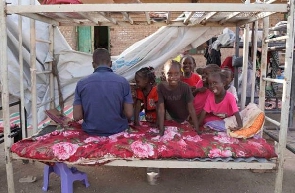Jaafar Abbakar’s four children are among 19 million students in Sudan who are out of school as the country marks six months since the brutal conflict began.
More than 10,000 schools have closed because of a war between the army and paramilitary Rapid Support Forces (RSF) that has devastated many areas of the country - including the capital, Khartoum, and its twin city of Omdurman.
Mr. Abbakar and his family are among those who now live in one of an estimated 170 schools that are serving as emergency shelters for people displaced by the fighting.
But even if schools were to reopen, his children are not ready to go back, he says.
"It is difficult because of psychological reasons. Under such situations, a person cannot go to school. There are no promising signs that the war will end."
Mr Abbakar, who fled Umbada near Omdurman to eastern Gedaref state, tries to keep his children occupied in their new home, which he hopes will be temporary.
"I try to educate them as much as possible. We can't do much, but we do what we can to help but it's not sustainable.
"We try to revise with them at home and redirect their attention to the academic year so that they forget the effects of the war for a while."
For his 15-year-old daughter Eram, it is more than schoolwork that is at stake. She says she desperately misses her school friends: "After we separated, there was no communication between us."
The UN Children’s Agency (Unicef) estimates that even before the war broke out nearly seven million children were out of school because of poverty and instability.
The conflict has pushed an additional six-and-a-half million children out of classrooms in areas where there is fighting - and another five million have been affected by the school closures, it says.
Unicef and other non-governmental organisations are supporting initiatives like e-learning platforms, but these cannot be considered an alternative to formal education, and the government should open schools as soon as possible, it says.
Click to view details



Africa News of Friday, 20 October 2023
Source: bbc.com
Sudan war: A father's struggle to educate his children
 This school in El Gazira state is one of many that houses people forced from their homes since April
This school in El Gazira state is one of many that houses people forced from their homes since April
















